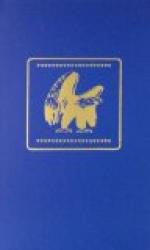Mark Twain made of 1601 a very smart and fascinating performance, carried over almost to grotesqueness just to show it was not done for mere delight in the frank naturalism of the functions with which it deals. That Mark Twain had made considerable study of this frankness is apparent from chapter four of ‘A Yankee At King Arthur’s Court,’ where he refers to the conversation at the famous Round Table thus:
“Many of the terms used in the most matter-of-fact way by this great assemblage of the first ladies and gentlemen of the land would have made a Comanche blush. Indelicacy is too mild a term to convey the idea. However, I had read Tom Jones and Roderick Random and other books of that kind and knew that the highest and first ladies and gentlemen in England had remained little or no cleaner in their talk, and in the morals and conduct which such talk implies, clear up to one hundred years ago; in fact clear into our own nineteenth century—in which century, broadly speaking, the earliest samples of the real lady and the real gentleman discoverable in English history,—or in European history, for that matter—may be said to have made their appearance. Suppose Sir Walter [Scott] instead of putting the conversation into the mouths of his characters, had allowed the characters to speak for themselves? We should have had talk from Rebecca and Ivanhoe and the soft lady Rowena which would embarrass a tramp in our day. However, to the unconsciously indelicate all things are delicate.”
Mark Twain’s interest in history and in the depiction of historical periods and characters is revealed through his fondness for historical reading in preference to fiction, and through his other historical writings. Even in the hilarious, youthful days in San Francisco, Paine reports that “Clemens, however, was never quite ready for sleep. Then, as ever, he would prop himself up in bed, light his pipe, and lose himself in English or French history until his sleep conquered.” Paine tells us, too, that Lecky’s ‘European Morals’ was an old favorite.
The notes to ‘The Prince and the Pauper’ show again how carefully Clemens examined his historical background, and his interest in these materials. Some of the more important sources are noted: Hume’s ’History of England’, Timbs’ ‘Curiosities of London’, J. Hammond Trumbull’s ’Blue Laws, True and False’. Apparently Mark Twain relished it, for as Bernard DeVoto points out, “The book is always Mark Twain. Its parodies of Tudor speech lapse sometimes into a callow satisfaction in that idiom—Mark hugely enjoys his nathlesses and beshrews and marrys.” The writing of 1601 foreshadows his fondness for this treatment.
“Do you suppose
the liberties and the Brawn of These States have to
do only with delicate
lady-words? with gloved gentleman words”
Walt
Whitman, ‘An American Primer’.
Although 1601 was not matched by any similar sketch in his published works, it was representative of Mark Twain the man. He was no emaciated literary tea-tosser. Bronzed and weatherbeaten son of the West, Mark was a man’s man, and that significant fact is emphasized by the several phases of Mark’s rich life as steamboat pilot, printer, miner, and frontier journalist.




